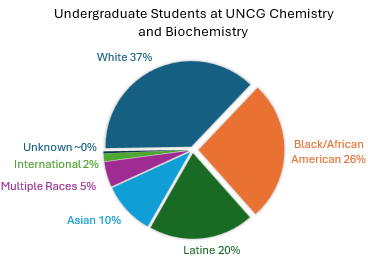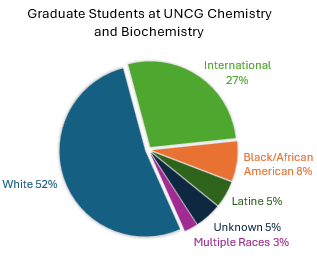About
Diversity Statement
The Department of Chemistry and Biochemistry at UNCG is committed to fostering an inclusive and supportive climate where diversity is embraced and celebrated. We strive to promote a climate of civility and respect, where diverse viewpoints and experiences are welcomed. As a minority-serving institution, we are proud to serve a vibrant, diverse student body, and we are deeply committed to our mission of providing access and opportunity for all.
 We believe that the complex challenges of science are best approached by a team of individuals with a wide range of perspectives and life experiences. Our Department’s commitment to offering a welcoming and supportive environment for people from all walks of life is a major contributor to our success. As such, we are making efforts to support a diverse demographic composition at all levels in our Department. A key achievement in this effort is our progress in gender diversity: as of 2023, women comprise nearly half of our tenured/tenure-track faculty, a stark contrast to the 60% gender gap of the average of the top 50 Chemistry Departments in 2016, and the 36% gap of the most diverse of those schools! Furthermore, 30% of our teaching faculty, 38% of our staff, 48% of our graduate students, and 67% of our undergraduate students are women. In addition to strong gender diversity, our faculty and staff are members of other marginalized groups and individuals with non-traditional career paths.
We believe that the complex challenges of science are best approached by a team of individuals with a wide range of perspectives and life experiences. Our Department’s commitment to offering a welcoming and supportive environment for people from all walks of life is a major contributor to our success. As such, we are making efforts to support a diverse demographic composition at all levels in our Department. A key achievement in this effort is our progress in gender diversity: as of 2023, women comprise nearly half of our tenured/tenure-track faculty, a stark contrast to the 60% gender gap of the average of the top 50 Chemistry Departments in 2016, and the 36% gap of the most diverse of those schools! Furthermore, 30% of our teaching faculty, 38% of our staff, 48% of our graduate students, and 67% of our undergraduate students are women. In addition to strong gender diversity, our faculty and staff are members of other marginalized groups and individuals with non-traditional career paths.
Our Department’s student body reflects strong racial and ethnic diversity: 67% of our undergraduates self-identify as non-white, with 27% identifying as Black or African American and 19% as Latine. Similarly, 55% of our graduate students are non-white, with 15% Black or African American, 5% Latine, and 25% international students. The Department is also home to many members of the LGBTQ+ community, student veterans, first-generation students, and non-traditional students. By training students from diverse backgrounds, we are actively building the pipeline of future chemists from underserved groups.
While we celebrate the gender diversity of our student body, we recognize the need to better reflect this diversity in our faculty. We are actively working to recruit faculty in future hires, with a particular emphasis on individuals who have an understanding of, appreciation for, experience with, and a commitment to racially and ethnically diverse students including those who identify as Black, Indigenous, and/or LatinX, aiming to close this gap and better mirror the diversity of our students.
Our Department strives to continue our efforts to recruit and support diversity in a variety of additional ways, including:
- Establishing the Community-Building Committee (previously Diversity, Equity, Inclusion, and Access (DEIA) Committee), composed of faculty, staff, postdocs, and students, to ensure our department is a welcoming space for all.
- Organizing regular community-building events, networking opportunities, and support groups.
- Eliminating the GRE requirement for graduate admissions, acknowledging its weak correlation with the “ultimate success” in STEM fields, and potential perpetuation of sexual, racial, and socioeconomic inequities.
- Hosting speakers who focus on DEIA research to share evidence-based strategies for overcoming barriers to equity and diversity in academia.
- Participating in conferences and events hosted by organizations such as NOGLSTP, SACNAS, NOBCChE, GRC, AISES, and OXIDE.
- Offering annual training opportunities on topics including microaggressions, mental health, and quality mentoring.
- Periodically assessing our department’s climate to guide data-driven initiatives for continuous improvement.
*The survey used the terms “Hispanics of any race” and “Non-resident alien” which we have replaced with “Latine” and “International” respectively.
As a department, our efforts in promoting diversity, equity, and inclusion have been recognized by the following awards:
- 2023 Stanley C. Israel Regional Award for Advancing Diversity in the Chemical Sciences from the Southeastern Regional Meeting of the American Chemical Society.
- 2023 Seven Seals Award from the Employer Support of the Guard and Reserve.
- 2024 Dean’s Award for the Promotion of Diversity and Inclusiveness from the College of Arts & Sciences at UNCG.
While these honors highlight our progress, they also remind us that our journey toward creating a more inclusive and equitable academic environment is ongoing. We are committed to continuing this important work and building a scientific community where everyone has the opportunity to succeed.







